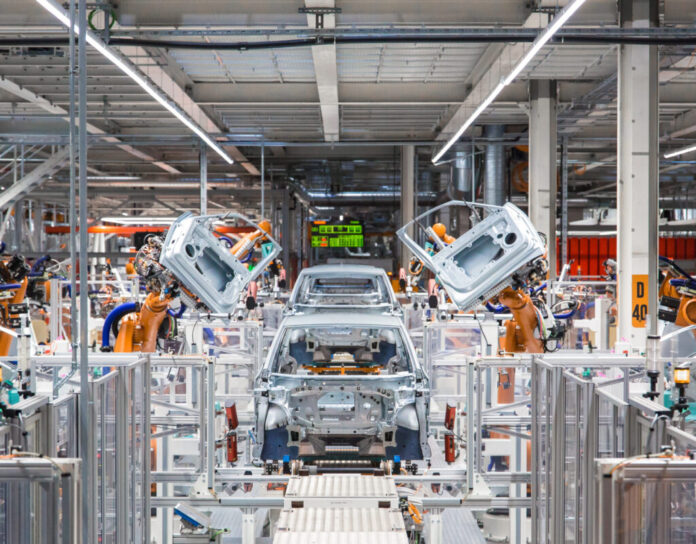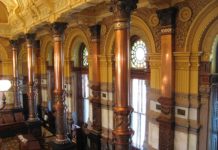(Updated to include developments from Thursday’s hearing)
The Commerce Department is making another run at a major piece of economic development legislation that would help the state attract an electric vehicle or hydrogen-powered vehicle manufacturing plant.
Bob North, legal counsel for the department, appeared before the House Commerce Committee on Thursday to pitch the legislation that’s intended to build on the tax incentives provided to Panasonic two years ago.
The bill also could be used to bring a national headquarters for an electric battery plant as well as a manufacturer of electric or hydrogen-powered motor vehicles.
The exact cost of the incentives – compared to a smaller variation the tax breaks given to Panasonic – is unclear although it’s expected to range in the tens of millions of dollars.
North told lawmakers that the state is negotiating with less than five businesses that might benefit from the proposed incentives.
He said the companies are expected to make decisions about where to locate within the next year.
Commerce has sold the bill on the idea that the timing is ripe for this particular type of incentive since automobile manufacturers have announced more than $1.2 trillion in planned electric vehicle production investment by 2030.
“Kansas is poised right now to take advantage of the estimated over a trillion dollars that’s going to be invested in EV- and hydrogen-powered vehicles over the next six or seven year,” North told the committee on Thursday.
“All of the major auto manufacturers in the U.S. are investing heavily in the EV space,” North said. “There are tens and tens of billions of investment in jobs and this is the time for Kansas to create this new tool.”
The proposal first surfaced at the end of last year’s legislative session when the Senate Commerce Committee hurriedly held a hearing on the bill just two days before the Legislature adjourned for the year. The bill never advanced out of the Senate committee.
Republican state Rep. Sean Tarwater said he agreed to hold a hearing on the bill, but couldn’t speculate if it would advance, especially after the generous package of incentives that were already approved for Panasonic’s electric battery plant in De Soto.
“We’ve got a lot of work to do on the bill to make it right,” Tarwater said.
Tarwater said he needed to confer with legislative leadership before deciding whether to move ahead with the bill after Thursday’s hearing.
Two years ago, the Legislature approved economic development incentives worth an estimated $1.3 billion for Panasonic. The incentives were awarded to one other company, but they have been brought to an end.
Some lawmakers saw the proposed package of tax incentives as alternative way to adopt a smaller, but lucrative package of tax incentives for a major project.
Other lawmakers voiced angst that the incentives would only shift jobs, not create new ones.
“I am very concerned that all we’re doing is shifting employment from one place in Kansas to another place in Kansas and for that shift we pay for it,” said Republican state Rep. Kristey Williams of Augusta.
North said that creating better paying jobs provides upward mobility for Kansans, including for employees who might take jobs vacated by someone who left for a new employer.
“It lifts everybody,” North said. “It provides upward mobility and we think that’s important.”
Other lawmakers were reticent, saying it was too soon to create a new economic development incentive after the Panasonic deal from two year ago.
“We just keep cranking this stuff out,” said Republican state Rep. Bill Sutton of Gardner.
“Before we start cranking out more and more of these incentive programs, let’s make sure we’re doing it right,” Sutton said.
“It’s fatigue,” he said. “Let’s make sure we’re right before we’re do it again, again and again. It’s going to take a while before we start seeing the results.”
Republican state Rep. Kyle Hoffman of Coldwater questioned why the proposed incentive package isn’t made to a broader pool of economic development prospects.
He said the incentives for Panasonic and Integra need to be allowed to play out before starting a new program.
“We need to see how that goes,” Hoffman said.
“If EV manufacturing really is a big deal it’s not like we only have this short window. It’s going to be something that’s going to be around for a while.”
The bill only applies to the assembly of electric vehicle and hydrogen-powered vehicles, components and subassembly manufacturers, and their respective headquarters or research and development facilities.
The bill provides these incentives under certain circumstances:
- Payroll tax: Employer could keep up to 100% employee payroll withholding taxes for up to 10 years as long as the company maintains a median wage paid to new employees that’s equal to or greater than 120% of the county’s median wage.
- Capital investment tax credit: Up to 10% of total project capital investment in a
refundable tax credit that is paid over at least five years. - Sales Tax Exemption: A sales tax exemption for construction, renovation or expansion of the eligible project for the specific industry identified in the bill.
- Training: Allows a company to get reimbursed for up to one year of training or education expenses at a community or technical college for each new employee who can establish residency in Kansas after their training is complete. The maximum amount of the reimbursement would be $5 million per project.
The bill sets a $250 million capital investment requirement for vehicle assembly operations. The requirement would not apply to a headquarters or research and development activities.
The incentives would be available for projects that create at least 250 jobs within five years from the start of production.
The bill includes provisions for clawing back those incentives if the company doesn’t reach certain goals spelled out in the legislation.
The bill, which is expected to cost millions, defines battery manufacturing as one of the activities that a company would have to be engaged in to qualify for the tax break.
The incentive also could include a headquarters for an electric battery plant as well as a manufacturer of electric or hydrogen-powered motor vehicles.
Democratic state Rep. Jason Probt of Hutchinson acknowledged that he wasn’t a fan of using tax incentives, but said the Legislature should be in tune with world economic development patterns.
“Even though at my core I don’t like this model, I do have the knowledge that the federal government is pumping tons of money into this infrastructure and into this development and the rest of the world is moving this way,” Probst said.
“I think it’s less of an omission based on political or any philosophy and more of trying to acknowledge the world is moving a certain way and we should be poised to capture that,” Probst said.
















